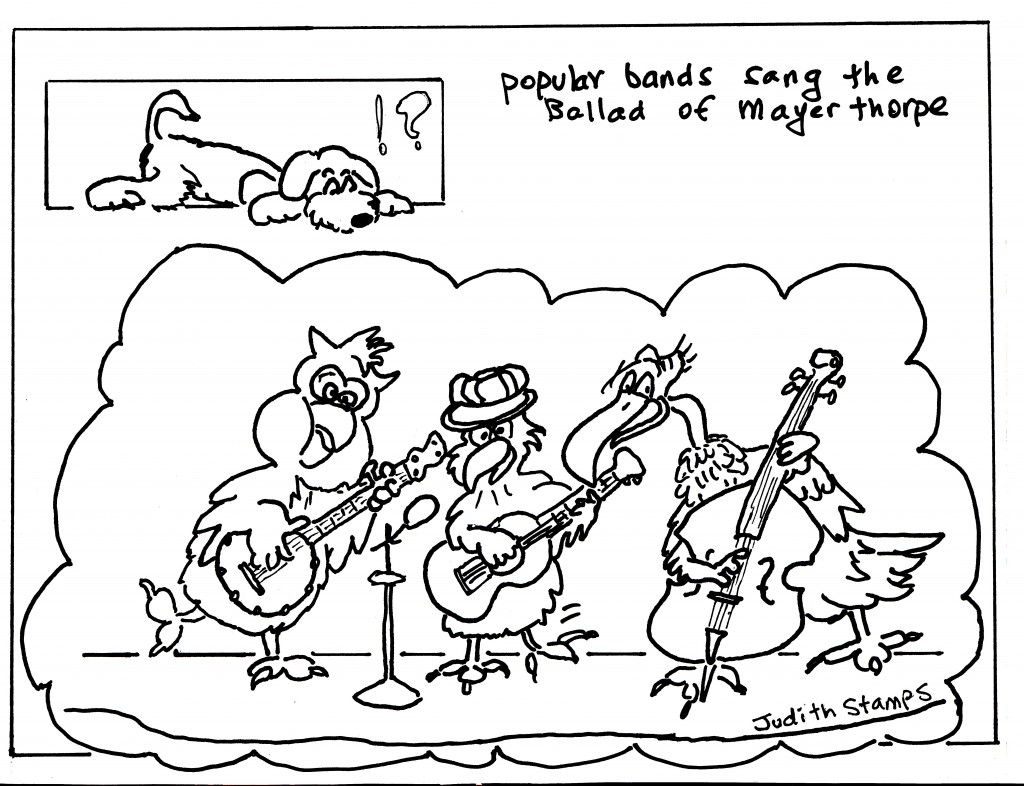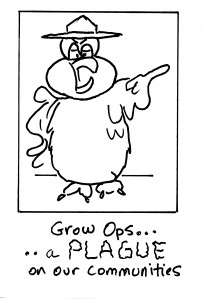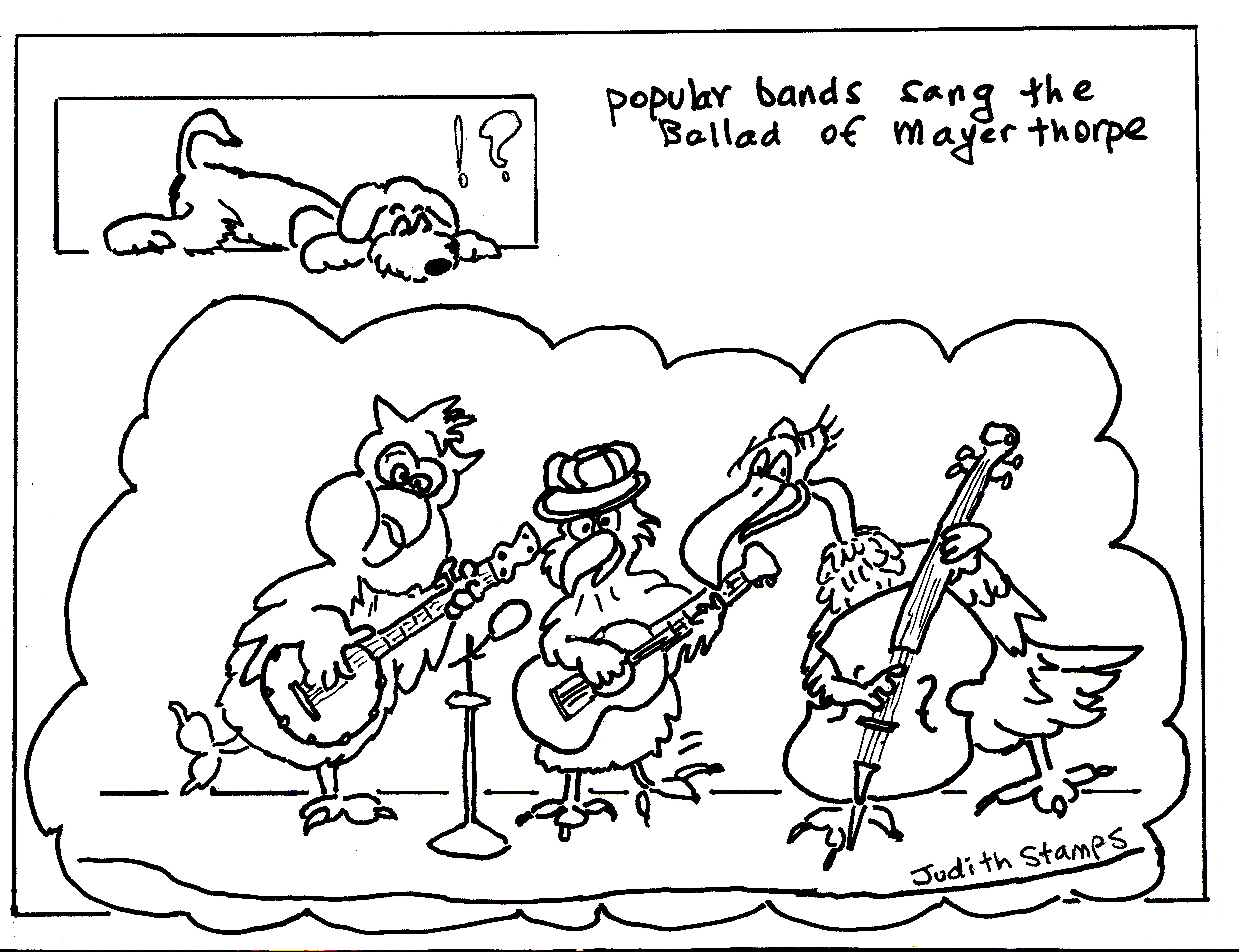
In Weedy Blues Part One, we looked in detail at how newspapers in Canada, especially in BC, have helped to create a contemporary spectacle: the “grow-op” scare. Based on content analysis provided in Susan Boyd and Connie Carter’s Book, Killer Weed: Marijuana Grow-ops, Media and Justice, we noted that elements of this scare included harping on indoor growing hazards, especially fire and mould; and on the notion that growing is currently the province of criminal gangs. Facts to support these distortions came from RCMP funded reports, whose authors consistently misrepresented their own data. In response, as we saw, some BC municipalities introduced programs of enforced home “safety inspections,” whose sole purpose was to find “grow-ops.” In this they were aided by the BC Safety Standards Amendment Act of 2006, which allows BC Hydro to share information with municipalities and with the RCMP.
But journalists are not magicians. They cannot conjure a drug scare without some basis in fact. For this they depend on key events, often catastrophic in nature. Canada’s opium scare, and the Opium Act of 1908, for example, followed on the heels of anti Asian riots in Vancouver, BC in 1907. Marijuana prohibition in Canada, in 1923, followed a series of hysterical, US inspired articles by Canada’s first female magistrate, Emily Murphy. Published in MacLean’s magazine, they linked racial hatred and violence to a plant virtually unknown to readers of the day. The contemporary “grow-op” scare has followed an event all its own: the Mayerthorpe tragedy.
On March 3, 2005, RCMP officers were called out to a small farm in Mayerthorpe, Alberta, as backup for bailiffs attempting to repossess a truck on which owner, James Roszko, had stopped making payments. On the property, inspectors found stolen car parts, evidence of a chop shop; ammunition and a night vision scope, evidence of a weapon; and marijuana plants. Roszko was nowhere to be seen. As it was late in the day, four guards were left on the property to await the arrival of an Auto Theft Unit in the morning. The guards were junior officers. In the hours that followed, James Roszko ambushed, shot and killed all four. He later turned the gun on himself.
Despite the complexity of the scene, news coverage focused on the plants. Initial reports called Roszko a ”cop hater” with a grow-op linked to organized crime. Authorities quoted in the news might as well have been vying for best song title: “Marijuana and Organized Crime Are All Around Us,” (Alberta’s solicitor general, Harvey Cenaiko;) “A Plague on our Society,” (RCMP officer, Guiliano Zaccardelli;) and “Let’s Have Stiffer Sentencing,” (Minister of Public Safety, Anne McLennan.) BC’s attorney general, Geoff Plant had the key theme. Growers of yesterday were good-natured, if misguided, local bumpkins. Growers of today are international criminals. Dissenting voices appeared here and there, in letters to the editor, or in editorials, but never on the newspapers’ main program. Over time the accepted story became: “grow-op” led to murder.

Six years later, in 2011, there was an official report on this event to the Minister of Justice and the Attorney General. It turned out that Roszko had a history of violence: he had had six previous convictions. He was a sexual predator: he had attacked local youth. He had been prohibited from owning guns; yet he still had one. He had long been of “Special Interest” to local RCMP. Moreover, he had never been involved with organized crime. He was a loner who happened to have some plants.
But the damage to public perception was irreparable: the Mayerthorpe tragedy had become a morality tale. In 2007, popular singer Corb Lund wrote a verse about the event in his song, “Horse Soldier, Horse Soldier.” Officers had been killed,” he sang, ”in scarlet coldest blood.” In 2008, CTV aired a TV Movie called “Menace,” originally titled “Mayerthorpe.” The description in IMDb calls the film a semi-fictional story based on “a shooting during a drug raid.” In 2009, musician, Ko Kapaches, released his song, “The Ballad of Jimmy Roscoe,” whose chorus ran:
[su_quote] He spent most of his time with his crops in the field
He’s loading and cleaning his steel, thinkin’
They, they gonna feel how I feel
If they get between me and my high[/su_quote]
This morality tale had a practical effect as well. In Susan Boyd’s words, it sparked a more rigorous alignment of professionals: RCMP, police, real estate and insurance agents, mayors, city councilors, and BC Hydro. They formed the eye of the safety inspection storm that followed
In 2005, hard on the heels of Mayerthorpe, the municipality of Surrey introduced its Electrical and Fire Safety Initiative (EFSI.) The program worked as follows. A dedicated EFSI team received information on electricity consumption from BC Hydro, and homes were selected for inspection. Owners were given 48 hours to book an inspection; electrical service was cut for anyone who failed to comply. The team was not required to obtain search warrants. It charged homeowners $3, 800 each for an inspection; they were required to pay even if nothing of interest was found. It has to be a tribute to the fear inspired by all of the above that Surrey residents did not take to the streets.
Then on May 28, 2007, the team knocked on the wrong door. Jason Arkinstall was a Surrey homeowner within an indoor pool, hot tub, sauna and green house. He used a fair bit of electricity. He agreed to allow electrical and fire inspectors into his home, but refused entry to the RCMP. When BC Hydro cut his power, he moved his family to a hotel, and contacted lawyer and constitutional expert, Joseph Arvay. With support from the BC Civil Liberties Association (BCCLA), Arkinstall petitioned the BC Supreme Court to rule that the 2006 BC Safety Inspection Amendment Act infringed on Charter Rights. He won. It is no longer legal for local RCMP to enter a home without a warrant, even to look for a plant. During the hearing, Arvay informed the Court that, since 2006, BC Hydro had forwarded information on 6,000 Surrey homes to the Team. Of those, 1,000 had been inspected. Of the 1,000, one had been found with a “grow-op.”
The storm continued. In 2008, the Municipality of Mission passed its Controlled Substance Property Bylaw. In Mission, RCMP accompanied the Public Safety Inspection Team (PSIT,) but waited outside, in plain view. Mission inspectors charged homeowners $5,200 each. In theory, owners paid only if the PSIT found evidence of a “grow-op.” Evidence meant finding any of following: potting soil, plant remains, unauthorized building modifications, altered wiring or plumbing, plastic covered windows, mould or moisture. In practice, there was no escaping this list. Three years into the storm, some people in Mission had had enough. In May 2011, 499 residents launched a class action suit against the District. A Mission town hall meeting, viewable on Youtube, reveals their distress. People felt violated. They called the PSIT rude and intimidating. They accused it of producing false reports. They called the program a cash grab. They wondered how the PSIT had the right to share information with third parties, such as home insurers and mortgage holders. Some insurers had cancelled insurance, and some banks had called their loans. People had lost homes. In the words of BCCLA lawyer, Michael Vonn, the citizens of Mission were being tied to “imaginary grow-ops,” with no effective means of escape.
Unhappily, the Mission case has proven to be complex. For reasons difficult to discern, it has stalled, and is unlikely to go forward. No one can say why. After viewing the Mission town hall meeting, I contacted City Councilor, Larry Nundal about the status of the case. He informed me that the plaintiffs had voluntarily withdrawn from it. I then telephoned plaintiff, Len Grotto, the man famously found to have been growing cucumbers. He had heard nothing for three years, and could not understand how the suit could have been halted without his knowledge. No one had told him anything. Moreover, he had attempted to contact the group’s lawyer, but had never received a call back. I then spoke with Michael Vonn, who had little to add to this tale. It was not the BCCLA’s case. Lost in the abyss, it appears to be no one’s case anymore.
Still, there is a bit of good news. In 2011, Mission disbanded its PSIT, and has halted automatic inspections. Some homeowners, like Len Grotto, were sent letters of apology; inspection fees were waived. While this story has no clear ending, the safety inspection storm has settled down. The illusion of a big safety issue, however, remains. It is integral to the Harper Conservatives’ current argument for shutting down medicinal home gardens. Because of her work in this area, Susan Boyd has been called as an expert witness for lawyer John Conroy’s Coalition suit against this proposed policy. In Weedy Blues Three, we look at facts presented in her affidavit in support of the suit. Tune in next Monday.
© Judith Stamps, June 6, 2014.




